Round Oak Iron Works was founded in Brierley Hill in 1857 by Lord Ward, later the first Earl of Dudley.

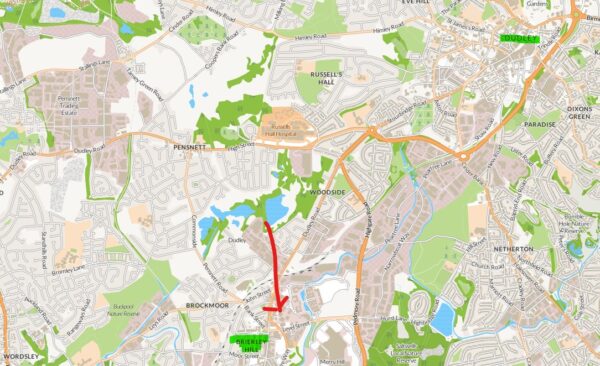
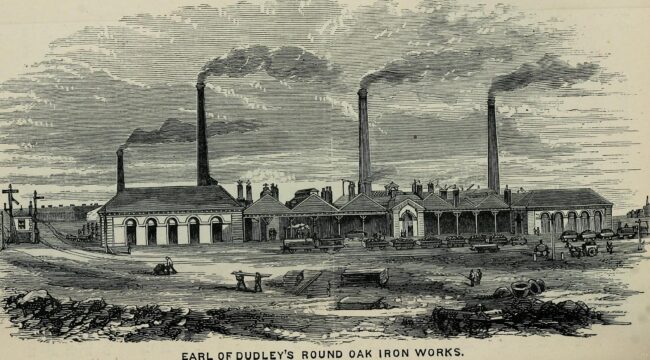
Known locally as the ‘The Earl’s’, the Works sprawled across a substantial part of Brierley Hill employing hundreds until its closure as Round Oak Steel Works in 1982.
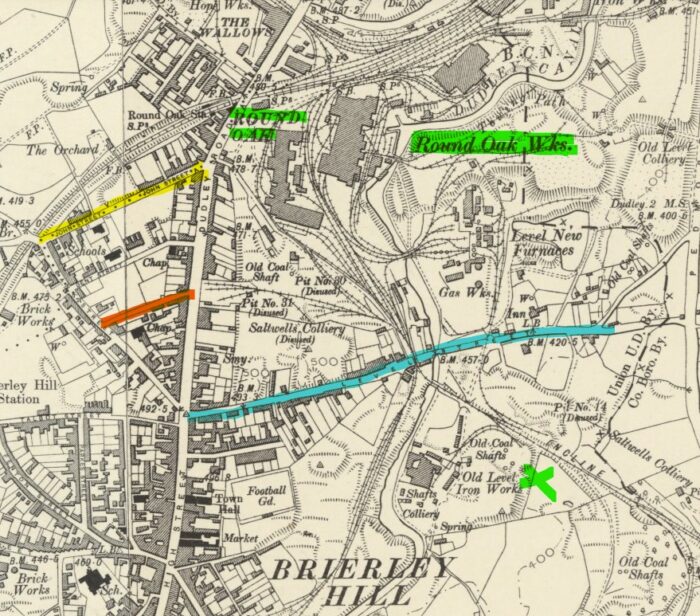
My great great grandfather, William Groves (1850-1917), was the gatekeeper, night watchman and timekeeper and worked at Round Oak for over 50 years.
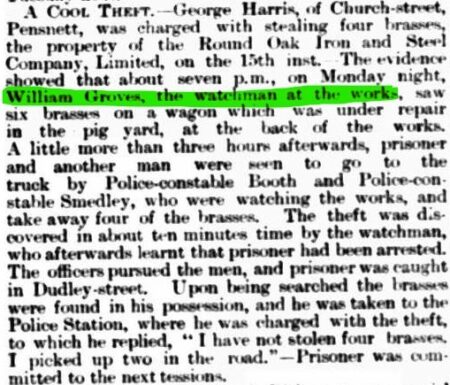
Newspapers reported he had lost an arm while working at the company and he probably became the Works’ gatekeeper after this event.
His sons followed their father to work at Round Oak. Newspaper accounts in 1933 concluded that the combined Groves family had completed over 200 years of aggregate service at Round Oak by that time. The family lived on streets close to the company – Wallace Street, Stourbridge Road, Vine Street, Level Street, John Street, Bent Street and Victoria Street – so that Round Oak’s chimneys would have loomed over their homes and lives.
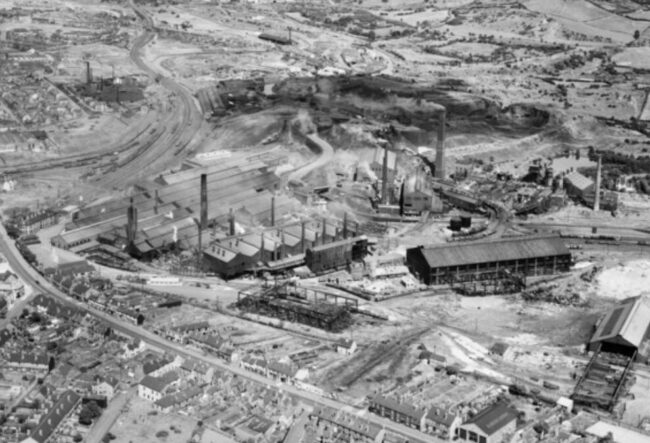
The Groves family exemplify the extent of the impact that Round Oak had on the local community. Working at Round Oak could lead to both death and injury but also provided opportunity for leisure activities and social mobility.
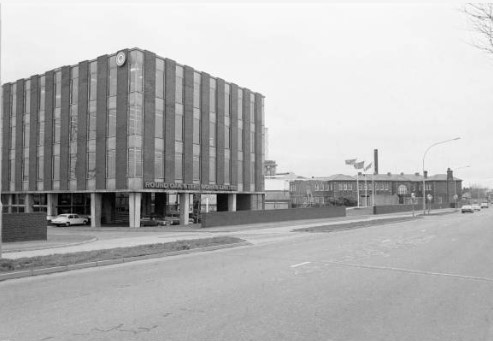
My connection to Round Oak Steel Works came full circle when I worked a summer job in the accounts department at the company offices shortly before the Works’ closure.
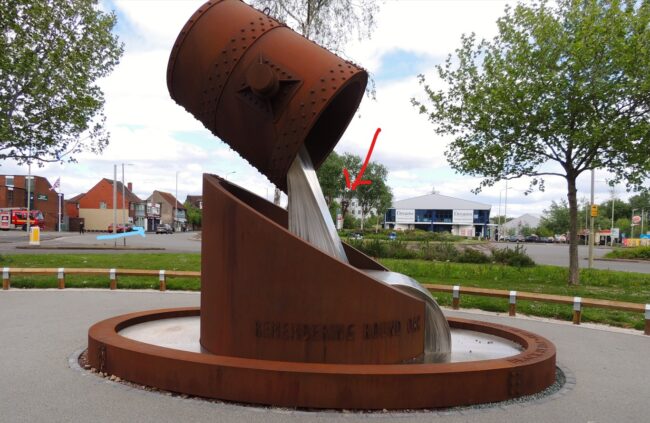
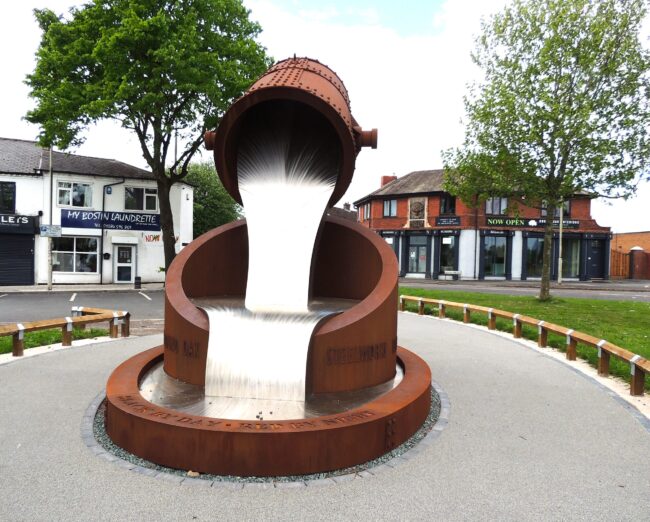
William Henry Groves
1876 – 19 April 1933
William Henry worked as a steam crane driver at Round Oak after leaving school and worked there all his life until becoming ill about a year before his death at his home on John Street at the age of 57.
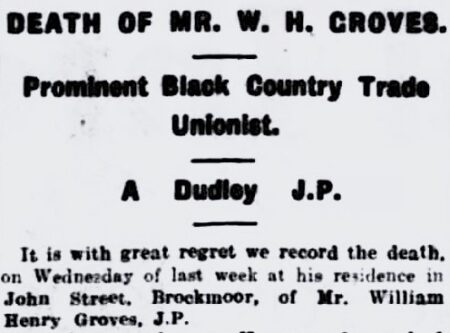
William took an interest in trade unionism as a young man. Eventually he became president of the Round Oak Branch of the British Iron and Steel and Kindred Trades Association and was frequently a delegate at the trade union and Labour Party conferences. One of his noted achievements was as a member of the negotiating committee for the implementation of an eight-hour day for workers. The Dudley Chronicle concluded that but for his illness that William may have gone on to become a Labour parliamentary candidate for Kingswinford.
He was a member of the Hospital Committee at Round Oak. A keen and talented cricket and bowls player, he helped to establish the Sports Club, was its first president and captain of the Round Oak cricket team.
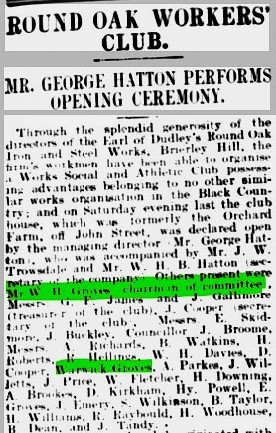
Hiis social engagement extended to being a Justice of the Peace for Dudley, president of the Brierley Hill Trades and Labour Council and involvement in a number of local charities.
In obituaries he was portrayed as an eloquent speaker, a man who was well respected and of ‘wise counsel, sound judgement and utmost fairness in negotiations who never lost his temper’.
An event was held in the assembly rooms at Round Oak Works Club to recognise William’s services in September 1932:

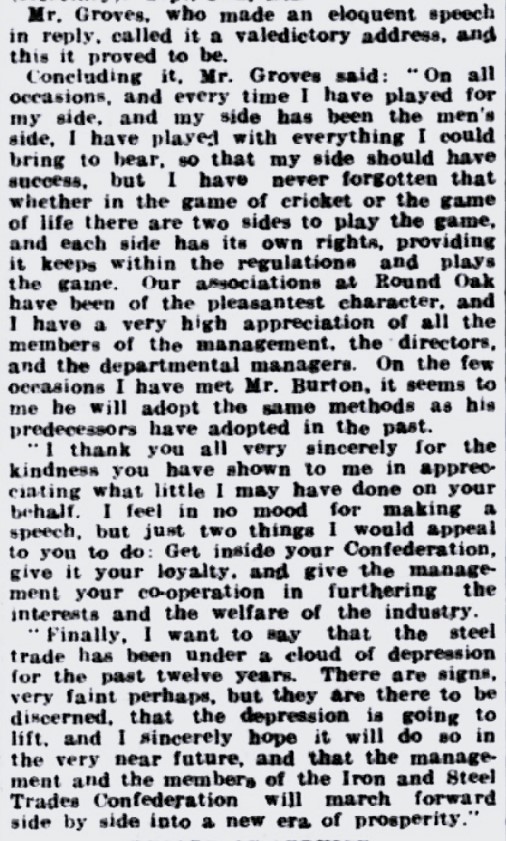
Arthur Groves
26 May 1881- 26 September 1902
William Groves (snr) finished work as the gatekeeper on 29 September 1902 at around six o’clock in the evening. He lived near his workplace at 88 Level Street and had to cross the railroad to get home. As he did so, he met his 21-year-old son, Arthur, who was going in the opposite direction and on his way to work his shift at Round Oak. William only saw his son again when he was brought home deceased at around ten o’clock that evening.
Arthur was a bar roller responsible for adjusting the thickness of rolls of steel as they were flattened on huge rollers. On the night of his death, pieces of metal going through the rollers forced a floor plate out of position. Arthur used a crowbar to attempt to pull this floor plate back into position when the bar got stuck in gearing wheels causing it to spin out with a terrific force and hit Arthur on the back of his neck. The blow broke his neck and a vertebra in his spine and caused a large blood clot. He died very shortly afterwards.
Thomas Groves
14 December 1882 – 6 August 1949
Thomas started as a crane driver on leaving school and later became a cold straightener, correcting or flattening any distortions in steel coils or sheets at room temperatures.
Thomas was witness to a works accident in March 1919 that resulted in the death of 22-year-old labourer, Rupert Williams, and appeared at the inquest in the Board Room at Round Oak into Rupert’s death. The accident occurred in the early hours of the morning when Rupert was near an overhead electric crane carrying steel. The chain of the crane broke and the steel fell so that one end fell on Rupert crushing him and killing him instantaneously.
Thomas testified that he had been working with Rupert and was about to post a bar into an electric straightener when he heard a crash and saw the accident. He went over to Rupert but his head was crushed and his neck broken. The coroner concluded that the death was an accident and that no-one was to blame for it.
Warwick Groves
14 August 1885 – 21 July 1954
Warwick spent his whole working life at Round Oak becoming foreman of the rolling mill. Also a keen sportsman, he was a member of the Round Oak bowling and football teams.

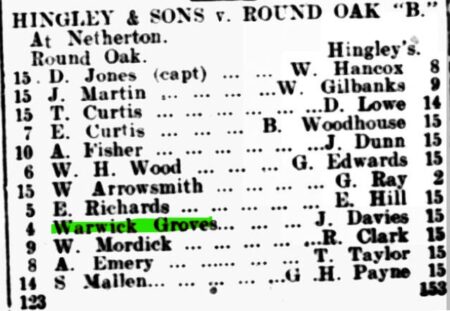

He too was involved in the local community and was made chairman of Brierley Hill Council tenants’ association in 1933. Newspaper reports in the same year stated that he had lost an arm in working at Round Oak.
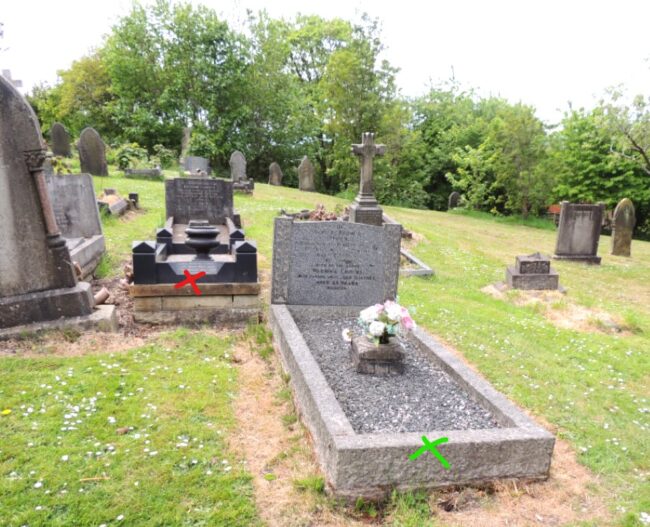
Bert Groves
December 1888 – 18 May 1915
William’s youngest son, Bert, was a labourer at the Old Level Iron Works which was taken over by Round Oak in 1908. Bert enlisted in the 1st South Staffordshire Regiment shortly after the outbreak of the First World War. He wrote to his parents on 12 April 1915 and this was reported in the local County Express newspaper:
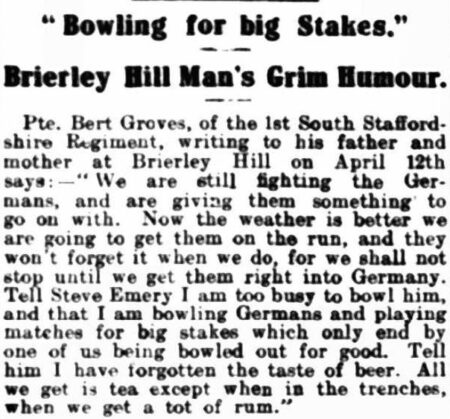
A month later the South Staffs were involved the Battle of Festubert and Bert was reported missing. Three months afterwards, his parents were informed that their son had been killed in action.
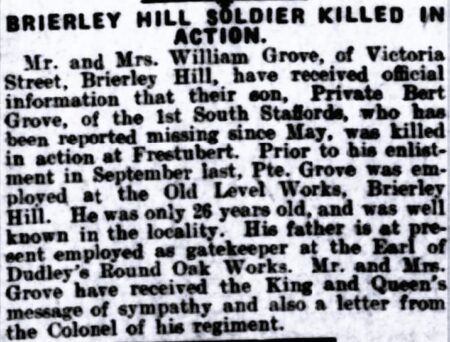
Bert is remembered at the Le Touret memorial in France:
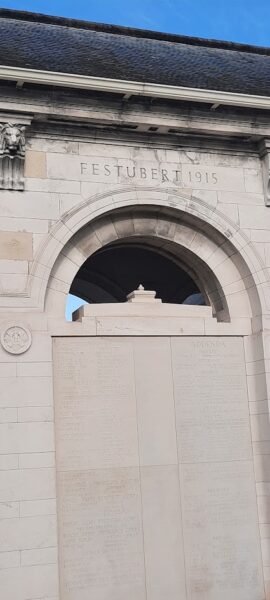
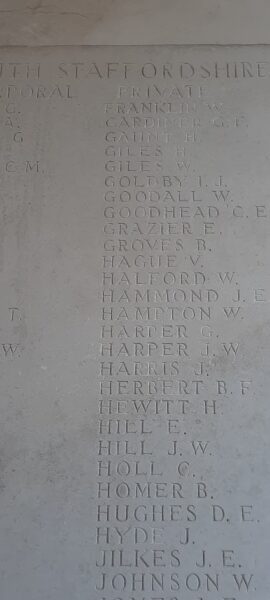
and on the Brierley Hill War Memorial:
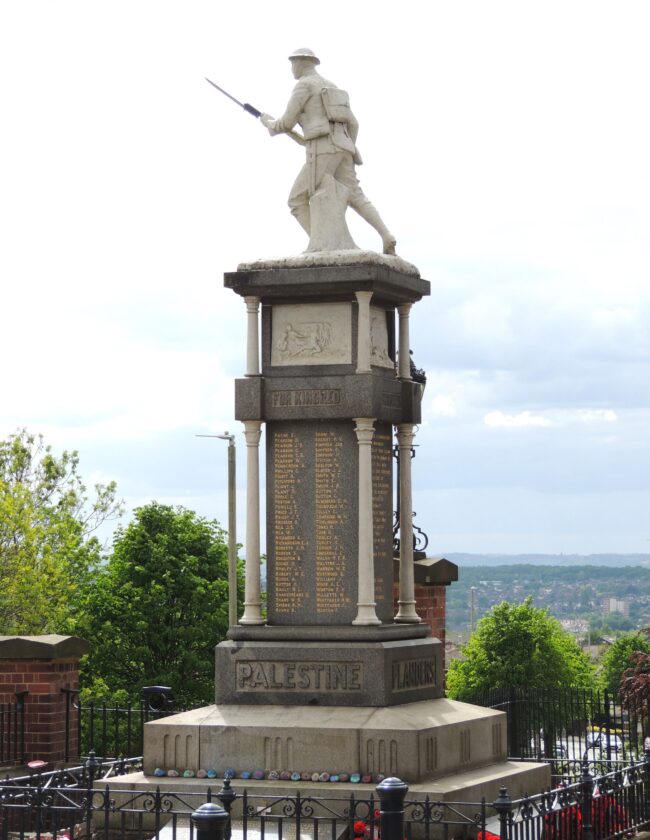
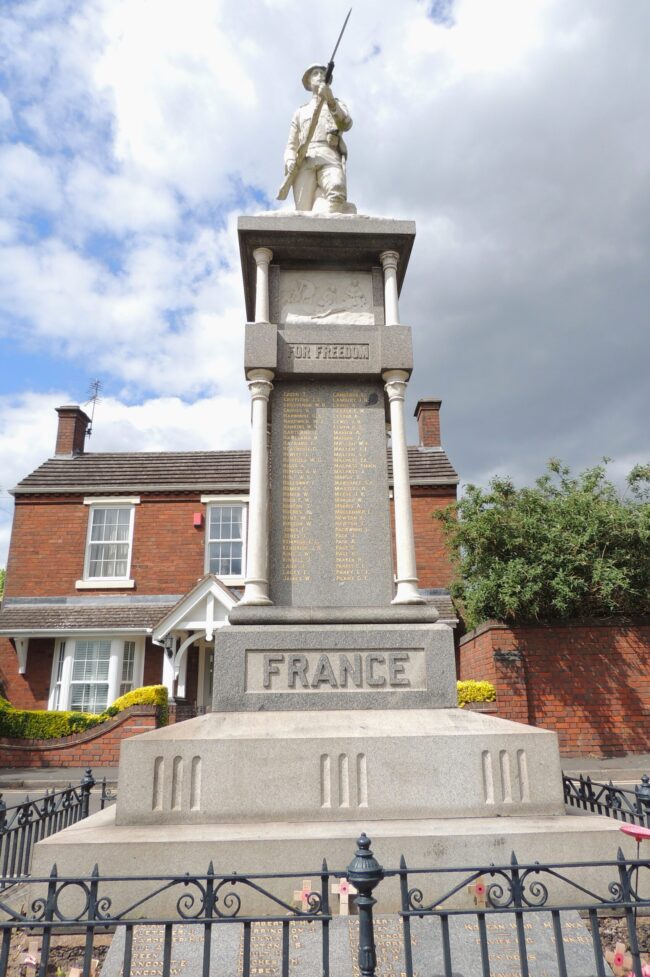
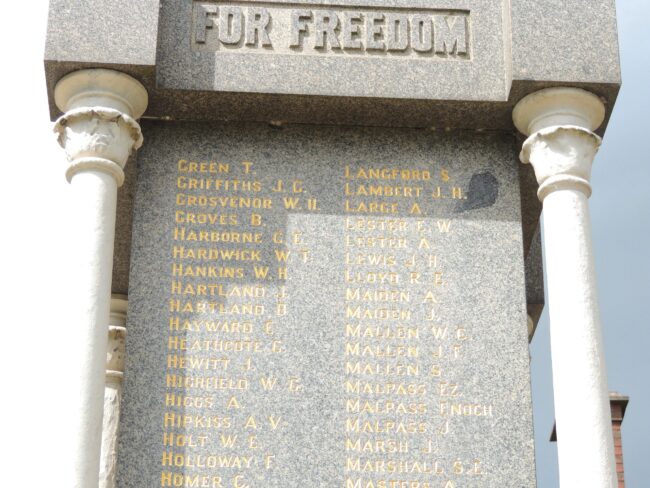
Joseph Edward Jeavons
15 November 1870 – 3 December 1943
Joseph went by the name Groves from the time of the marriage of his mother – Mary Ann Jeavons – to William Groves in July 1875 when his family took up residence in Brierley Hill. He also worked at Round Oak on leaving school but reverted to the name of Jeavons when he married in 1898. Shortly after the 1911 census was taken, he and his family moved to Wishaw to the south east of Glasgow where he continued to work as a cold straightener in the steel making industry.
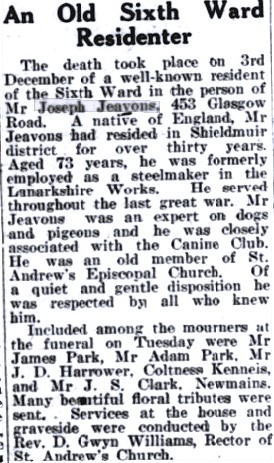
Joseph’s death certificate gave his mother as Mary Ann Jeavons and stated she had afterwards married William Groves who therefore was probably not his biological father.
William Groves & Mary Ann Jeavons
grandparents to my maternal grandfather
My great great grandmother, Mary Ann Jeavons, was born and raised in Dudley. Her son, Joseph Edward, was born in November 1870 and in April 1871 they were living at 13 Spring Gardens together with Mary Ann’s sister, Ruth, her husband and infant son both named William Smith.
My great grandmother, Florence, was born at 13 Spring Gardens in August 1874. Her mother was still unmarried and Florence was born with the Jeavons surname with her father not named on her birth certificate.
Joseph Edward Jeavons and Florence Jeavons were baptised seven months later in Netherton, about two miles from the centre of Dudley. The names of the parents given at this baptism were Mary Ann and William Jeavons and the witnesses were Ruth and William Smith. William Jeavons was presumably William Groves as he married Mary Ann Jeavons just three months later at the same church.
In 1911, the couple registered that their marriage had existed for 40 years when it had actually been 35 years. Newspaper reports often stated the Groves were a well-known and well-respected family in Brierley Hill and the couple may have buried parts of their past story in order to establish themselves into the community.
Unlike her brother Joseph, my great grandmother always gave her name as Florence Groves. She went on to work in service in Birmingham and Salford and then returned to Brierley Hill with her family to live on Level Street.
Was she a Groves or not a Groves? Were her siblings actually her stepbrothers and sisters? My assumption was that William Groves was her stepfather but a number of my DNA matches to the Groves lineage probably indicate that William Groves was indeed her father and William Groves is my biological great great grandfather.
Florence also had three sisters, Alice, Mary Ann and Maud. Alice worked in service, married William Oswald Talbot, a wholesale clothing salesman, and went on to live in Leeds in Yorkshire. Maud also worked in domestic service, then as a barmaid in a hotel in Lincolnshire and emigrated to Canada in 1912. Mary Ann attended Bent Street and Hart’s Hill schools but cannot be traced after this time.
The 1911 census states that William and Mary Ann Groves had had 16 children and seven of them had died. One of these was Arthur who died at Round Oak in 1902 but six children’s names remain unknown.

